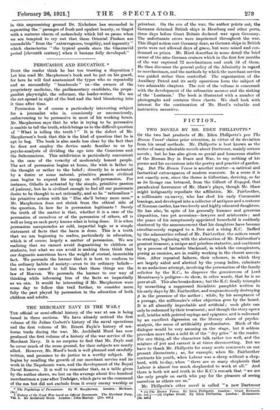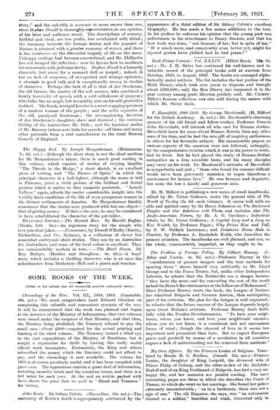FICTION.
TWO NOVELS BY MR. EDEN PHILLPOTTS.*
OF the two last products of Mr. Eden Phillpotts's pen The Bronze Venue claims prior attention, in virtue of its deviation from his usual methods. Mr. Phillpotts is best known as the writer of many admirable novels about Dartmoor, mainly serious novels ; but he has also given us genial and humorous studies of the Human Boy in Peace and War, to say nothing of his poems and his excursions into the poetry and practice of garden- ing. But The Bronze Venue is another matter—a satirical and fantastical extravaganza of modern manners. In a sense it is not exactly new, since the theme is Gilbertian, deriving, so far as its lineage can betraced, from the Gilbert of Engaged, that paradoxical forerunner of Mr. Shaw's plays, though Mr. Shaw might indignantly repudiate the affiliation. Mr. Fairbrother, a millionaire en-navvy, who has shed his early Communist leanings, and developed into a collector of antiques and a restorer of Norman castles, has two lovely and highly educated daughters. He has also, 'in spite of his generally humane and generous disposition, two pet aversions—lawyers and aristocrats ; and the peace of his sumptuously appointed household is suddenly shattered by the announcement that his daughters have become simultaneously engaged to a Peer and a rising K.C. Baffled by the adamantine refusal of Mr. Fairbrother, the suitors resort to strategy, beginning with the abstraction of Mr. Fairbrother's greatest treasure, a unique and priceless statuette, and continued by a process of fantastic blackmail, in which the conspirators, posing as enemies, are in reality working in the closest associa- tion. After repeated failures, their schemes, in which they are largely aided and abetted by the young ladies, culminate in an audacious attempt, involving the personation of the family solicitor by the K.C., to disprove the genuineness of Lord Mountracey's pedigree—to show, in other words, that he is no peer at all. This also breaks down; but the K.C. finally triumphs by unearthing a suppressed Socialistic pamphlet written in his early days by Mr. Fairbrother, and magnanimously destroying it in the presence of the author ; while, by his acceptance of a peerage, the millionaire's other objection goes by the board. It is all absurdly improbable and artificial ; such plots can only be redeemed bytheir treatment; and though the story opens well, bristles with pointed sayings and epigrams, and is enlivened by an excellent digression on the literary abuse of psycho- analysis, the sense of artificiality predominates. Much of the dialogue would be very amusing on the stage, but it seldom provokes more than a mild fit of the " dry grins " in the reader. For one thing, all the characters talk rather too well, and the mixture of jest and earnest is at times disconcerting. But we have to thank Mr. Phillpotts for many acute comments on our present discontents ; as, for example, when Mr. Fairbrother contrasts his youth, when Labour was a sheep without a shep- herd, with to-day, when " there are so many shepherds that Labour is almost too much shepherded to work at all." And there is both wit and truth in the K.C.'s remark that " we are the only people on earth who pay for the pleasure of seeing ourselves as others see us."
Mr. Phillpotts's other novel is called " a new Dartmoor
story," and the 8th-title is accurate in more senses than one, since Orphan Dinah 2 is thoroughlyrearesentative,in our opinion, of his later and mellower mood. The descriptions of scenery, faithful and vivid, are less prolix, less overloaded with detail ; the harmony between the human drama and the pageant of Nature is attained with a greater economy of means, and there is less insistence on the elemental tragedy of life on the moor. Unhappy endings had become conventional, and Mr. Phillpotts has not escaped the infection : now he knows how to moderate his seriousness with judicious levity. Orphan Dinah is a leisurely chronicle, but never for a moment dull or insipid ; indeed, it has no lack of surprises, of unexpected and strange episodes ; it abounds in good talk and is exceptionally strong in studies of character. Perhaps the best of all is that of Joe Stockman, the old farmer, the master of the soft answer, who combined a hearty humanity of speech with a cold selfishness of purpose ; who talks like an angel, but invariably acts on his self-protective instinct. The frank, intrepid heroine is a most engaging specimen of a modern woman of the people ; and the mitis sapientia of the old, paralysed huntsman ; the uncomplaining devotion of Joe Stockman's daughter, slave and doormat ; the cautious fidelity of the inarticulate Mr. Palk ; and the harmless malice of Mr. Bamsey (whose acts belie his speech)—all these and many other portraits form a real contribution to the rural Human Comedy of England.



































 Previous page
Previous page